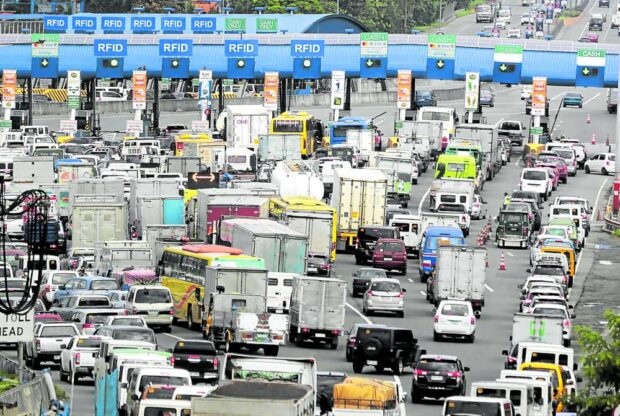MANILA, Philippines — Two senators on Tuesday objected to the looming increase in toll fees at the North Luzon Expressway (NLEx) and called on its operator to fix the worsening traffic conditions along the stretch of the highway before considering any adjustment in rates.
In separate statements, Senators Aquilino Pimentel III and Grace Poe called on the Toll Regulatory Board (TRB) to hold off its “quick” approval of toll hikes, saying this contrasted with the flow of traffic at NLEx.
“We pay tolls for a faster journey—that is exactly why it is called an expressway. We should approve toll fees at the same speeds that the expressway affords its users,” said Poe, chair of the Senate committee on public services.
Poe made the statement after Metro Pacific Investment Corp. (MPIC) announced the TRB’s approval of its proposed toll increase for the 101.8-kilometer stretch of NLEx, which spans from the Balintawak interchange in Quezon City to the Sta. Ines exit in Mabalacat City, Pampanga.
The TRB recently allowed a provisional toll adjustment at NLEx wherein Class 1 vehicles (car, jeepney, van or pickup) will have to pay an additional P7 in NLEx’s “open system” from Balintawak to Marilao in Bulacan starting Thursday.
An additional P17 for Class 2 (bus and light trucks) and P19 for Class 3 (heavy and trailer trucks) will also be implemented, according to MPIC.
On the NLEx “closed” system, from Marilao to Sta. Ines, motorists will pay an additional P26 for Class 1, P65 for Class 2, and P77 for Class 3.
Unjustified increase
Poe said the TRB and NLEx Corp., the MPIC unit managing the highway, must explain in detail the “drastic” increase to the motoring public, and urged the regulator to “look into the matter [from the perspective of] end-users.”
“If these were periodic adjustments from more than a decade ago, the TRB must explain why it only approved it now in one big swoop,” she pointed out.
She dismissed the justification earlier offered by the TRB and MPIC that the increases were covered by its public-private partnership (PPP) agreement.
“The question of reasonableness should not just be based on the PPP contract but also on traffic data. Is the expressway really providing express service? Is the convenience provided equal to what is being charged?” Poe asked.
She urged the government to consider “dynamic pricing” wherein approval of toll rate increases would be based on customer satisfaction or performance benchmarks.
“The (TRB) has the duty to ensure that the interests of the commuting public are also protected,” she explained.
Pimentel said “any increase at this point would be unjustifiable and unfair to the motorists” amid the “worsening” traffic conditions on the expressway and rising inflation.
He noted that based on the data of NLEx, at least 280,000 vehicles ply NLEx daily, and “to approve a provisional increase in light of these serious traffic concerns and the worsening inflation in the country is a disservice to the Filipino people.”
He also urged the TRB to prioritize the interests of the public and ensure that the toll rates remain fair and reasonable.


